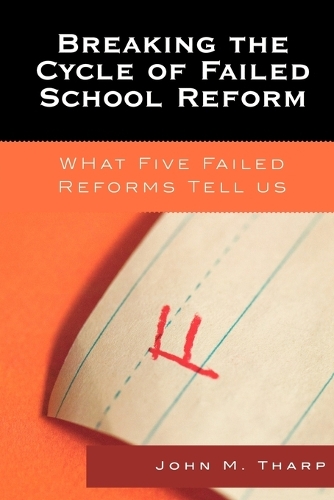
Breaking the Cycle of Failed School Reform: What Five Failed Reforms Tell Us
(Paperback)
Publishing Details
Breaking the Cycle of Failed School Reform: What Five Failed Reforms Tell Us
By (Author) John M. Tharp
Bloomsbury Publishing PLC
Rowman & Littlefield Education
28th November 2007
United States
Classifications
General
Non Fiction
Educational strategies and policy
History of education
371.200973
Physical Properties
Paperback
270
Width 154mm, Height 231mm, Spine 19mm
408g
Description
This book demonstrates how school reforms of the past 200 years share many common flaws. Based on an intensive three-year study of school reform in the United States, Breaking the Cycle of Failed School Reform analyzes and critiques the following historical reform movements: Lancastrian Plan, 1806; Age-graded Plan, 1848; Gary Plan, 1906; Trump Plan, 1959; School Development Plan, 1968; and Coalition of Essential Schools, 1984.
Emerging from the study was a set of reform rubrics. These six rubrics, each corresponding to twenty-six distinct variables, provide today's educators a lens through which their schools can be assessed against the historic plans. This process allows educators to easily determine their school's strengths and weaknesses with a strong sense of historical perspective. The book concludes with a set of recommendations for practitioners, policy developers, and researchers for what has to be included if school reform is to be successful in the future.
Reviews
It is gratifying to see an excellent dissertation focused on school reform disseminated in a book format that will be useful to practitioners, professors, and policy decision makers. Public schools as we know them are an anachronism. Dr. Tharp's study and recommendations for reform are visionary, challenging, and controversial, but should lead the way for reformers to replace our very outmoded system of education. -- Neil J. Shipman, clinical associate professor, Department of Educational Leadership, University of North Carolina at Chapel Hill
This is the first attempt to research and explain why all educational reforms in the post World War II era have had minimal or no effects. Dr. Tharp has done a splendid job of presenting his results and their implications. His conclusions are based on major reform efforts in that era. This, I predict, will be no less true for the No Child Left Behind reform. The educational community is in debt to Dr. Tharp for a very much needed effort to alert both the education community and the general public to see educational reform in a new light. -- Seymour B. Sarason, Ph.D., professor of Psychology, Emeritus, Yale University
This book is a must read for anyone interested in school reform and the reasons such efforts tend to fail. By tracing the historical roots of several educational reforms over a 150 year period of time while simultaneously applying Seymour Sarason's criteria to these same reforms, Dr. Tharp is able to document mistakes of the past, highlight issues of the present, and predict results of the future. -- Kathleen M. Brown, associate professor of Educational Leadership, UNC-Chapel Hill
I recommend John Tharp's book to the thoughtful reader who wants to come to a clearer understanding of educational reforms in America this archival analysis of educational reform. Nobody ever said change was going to be easy, but John Tharp's book lays out how very difficult and steep the challenges have been and will continue to be daunting to those who try. The record is definitely not for the faint of heart. -- Fenwick W. English, Teachers College, Ball State University
Author Bio
John Tharp is a high school principal in the Southeastern United States. He has worked as a public school teacher and administrator in the Southeast and Midwest.
